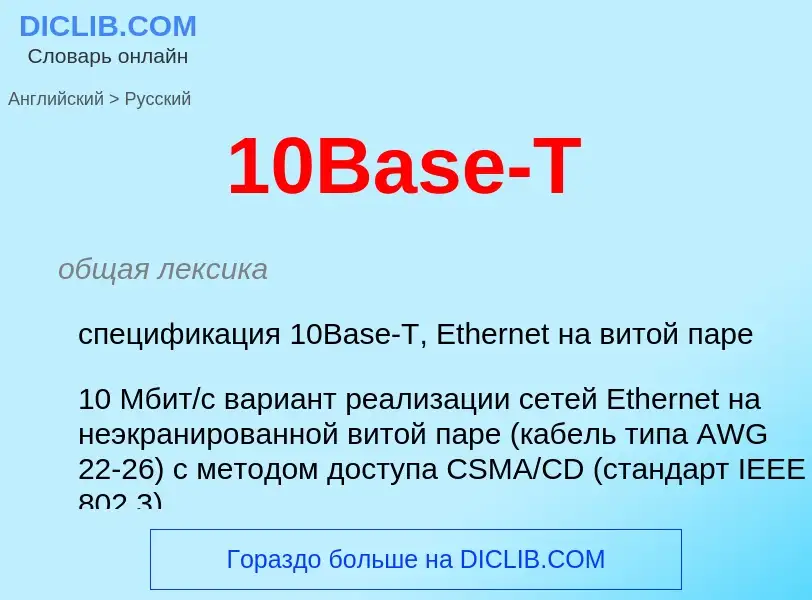Traduzione e analisi delle parole tramite l'intelligenza artificiale ChatGPT
In questa pagina puoi ottenere un'analisi dettagliata di una parola o frase, prodotta utilizzando la migliore tecnologia di intelligenza artificiale fino ad oggi:
- come viene usata la parola
- frequenza di utilizzo
- è usato più spesso nel discorso orale o scritto
- opzioni di traduzione delle parole
- esempi di utilizzo (varie frasi con traduzione)
- etimologia
10Base-T - traduzione in Inglese
общая лексика
спецификация 10Base-T, Ethernet на витой паре
10 Мбит/с вариант реализации сетей Ethernet на неэкранированной витой паре (кабель типа AWG 22-26) с методом доступа CSMA/CD (стандарт IEEE 802.3)
используются разъёмы RJ-45, кабельные системы Категории 3, 4 или 5. Максимальное расстояние между станциями (длина сегмента) до 90 м (160 м при использовании оборудования 3COM). Предусмотрен контроль целостности канала и возможность отключения сегмента в случае отказа без отключения всей сети
синоним
[t]
сокращение
от to (перед инфинитивом, начинающимся с гласной)
Definizione
. ·сокр. т. е., то есть; т. к., так как; и т. д. и так далее; и т. п., и тому подобное; т., том; тысяч.
Wikipedia

Ethernet over twisted-pair technologies use twisted-pair cables for the physical layer of an Ethernet computer network. They are a subset of all Ethernet physical layers.
Early Ethernet used various grades of coaxial cable, but in 1984, StarLAN showed the potential of simple unshielded twisted pair. This led to the development of 10BASE-T and its successors 100BASE-TX, 1000BASE-T and 10GBASE-T, supporting speeds of 10 and 100 megabit per second, then 1 and 10 gigabit per second respectively.
Two new variants of 10 megabit per second Ethernet over a single twisted pair, known as 10BASE-T1S and 10BASE-T1L, were standardized in IEEE Std 802.3cg-2019. 10BASE-T1S has its origins in the automotive industry and may be useful in other short-distance applications where substantial electrical noise is present. 10BASE-T1L is a long-distance Ethernet, supporting connections up to 1 km in length. Both of these standards are finding applications implementing the Internet of things.
The earlier standards use 8P8C modular connectors, and supported cable standards range from Category 3 to Category 8. These cables typically have four pairs of wires for each connection, although early Ethernet used only two of the pairs. Unlike the earlier -T standards, the -T1 interfaces were designed to operate over a single pair of conductors and introduce the use of two new connectors referred to as IEC 63171-1 and IEC 63171-6.


![Cat 6A cable]] with an M12X connector in one end and a modular connector in the other Cat 6A cable]] with an M12X connector in one end and a modular connector in the other](https://commons.wikimedia.org/wiki/Special:FilePath/M12X vs 8P8C ethernet connectors.webp?width=200)
![[[8P8C]] modular plug pin positioning [[8P8C]] modular plug pin positioning](https://commons.wikimedia.org/wiki/Special:FilePath/Rj45plug-8p8c.png?width=200)
